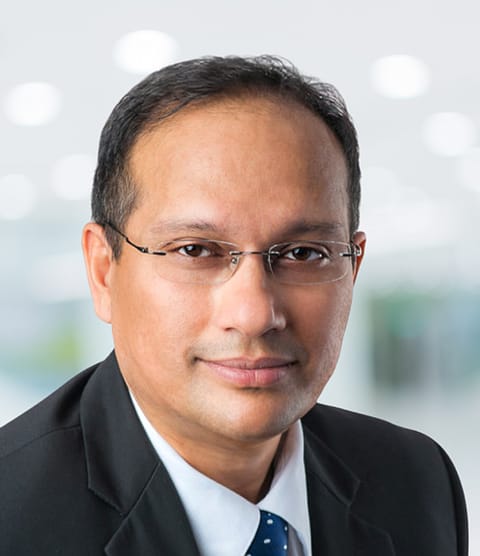Inside the reset at Cyient's biggest business
Under CEO Sukamal Banerjee, the group’s largest revenue segment, the Digital, Engineering & Technology business, is looking to reinvent its culture and market relevance to bring back growth.

Hyderabad-headquartered Infotech Enterprises, which rebranded itself as Cyient in 2014, now has two entities listed on the Indian stock exchanges, Cyient Ltd and its listed subsidiary, Cyient DLM, which is focussed on electronics manufacturing services.
To head Cyient’s largest business, the Digital, Engineering & Technology (DET) segment, the company brought in former Xorient chief executive and HCLTech veteran Sukamal Banerjee as the new CEO in mid-February this year. While some engineering, research and development (ER&D)-focussed IT companies have seen consistent growth in the past three or four fiscals, growth has been patchy for Cyient.
For the US-based Banerjee, the biggest takeaway from his engagement with employees across its offices in the past seven months has been the yearning for growth. From individual growth prospects to the company’s growth, Banerjee says he is aware of the expectations, “It's not that in seven months we have figured out all the answers, but I think we are in the right direction,” he says.
What is still a strength is the strong engineering legacy and its customer base that still resonates with its engineering-centric work; but what needs change is the performance culture, says the CEO. “Definitely, as an organisation, performance culture can be upgraded,” Banerjee says. “In the recent past, we have lost touch with the market in terms of relevance. For instance, are you holding on to what you have been successful with in terms of service lines? I think that is an area of work which we need to absolutely do,” he says.
In FY25, the DET business brought in revenues of $687.7 million, down 3% in constant currency from $714 million in FY24. The EBIT margin for FY25 also dropped by 261 basis points year-on-year to 13.5%. The company attributed the lacklustre performance in FY25 to movement in revenue and investment in sales and technology for growth.
On both growth and profitability, the CEO sees the roadmap defined for FY27 bringing back growth to high single digits or low double digits YoY and profitability margins back to 15%. The cost restructuring measures initiated by the company around April–May are likely to show results this fiscal, and the company is considering active acquisitions. “We have also put together a plan for FY27 and a slightly longer-term five-year plan, which has just been blessed by the board. We will share this with our employees and leadership first”, Banerjee says.
Acquisitions growth markets and AI
Recommended Stories
Besides organic growth, Banerjee says the company has chalked out a robust acquisition strategy, and the focus would be on data engineering and platform engineering companies. The acquisition focus is to look at companies that could bring both competency at scale and also help in portfolio diversification. “We are not looking for a $300–400 million acquisition from a revenue standpoint. We would want it to be near $100 million revenue. If they come with only one of those aspects, it'll be $40–50 million. That's what our idea is,” Banerjee explains.
Data engineering, which has been a key revenue generator for small- and mid-cap ER&D IT firms, involves preparing data for AI use, and Cyient’s exposure to asset- heavy industries makes it a ripe case for anAI offering. The company now has K.A. Prabhakaran as its chief technology officer (CTO). A Honeywell veteran, Prabhakaran was integral in the development of digital platforms and has closely worked with academia. “Today it is all about ecosystems, and ecosystems are not just the technology ecosystems of Nvidia, Microsoft, and so on—those are important—but also the ecosystem of universities, research data. Somebody may have an answer to the questions you are looking for, or they can solve it for you, and that is becoming very, very prevalent,” Banerjee adds.
The DET business sees nearly 49% of its revenues from the North America market and over 30% from the EMEA (Europe, the Middle East, and Africa). Of its three main revenue streams—Transportation & Mobility (Aerospace/Rail /Automotive), Networks & Infrastructure (Connectivity/Utilities), and Strategic Units (Mining & Minerals/Energy/Healthcare & Lifesciences), the company is looking to increase its share in the first segment, while also capturing the increasing global defence spending.
“We have what is called ITAR work and a few other levels of work clearance. We definitely would want to pursue full clearance so that we can capture the entire US defence market. We have that clearance already in the UK. So, we would like to at least make sure that between the US, UK, and India, we can leverage the growth of defense,” says Banerjee.
(INR CR)
With renewed spending on new R&D in sectors such as oil & gas, mining, and shipping, Banerjee says, “We definitely see the Middle East as an opportunity area for us because not only are they spending a lot of money, but they're also spending money in those sectors that are core to Cyient.” While still not a needle-mover, Banerjee sees “this as a very high-growth area for us”.
In reports on Cyient Ltd after its Q2FY26 earnings, brokerage firms like Motilal Oswal and Emkay, while acknowledging that deal activity and vertical performance are improving, highlight its uneven growth, with margin expansion still being a work in progress. Others like IDBI Capital and Axis mention the DET business is showing early signs of stabilisation and recovery.
